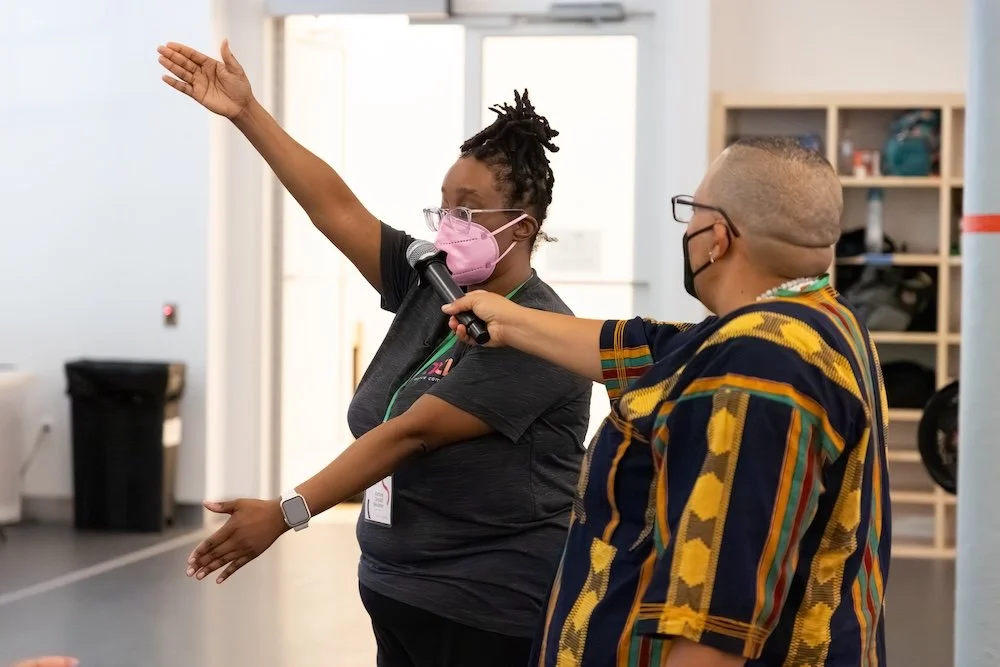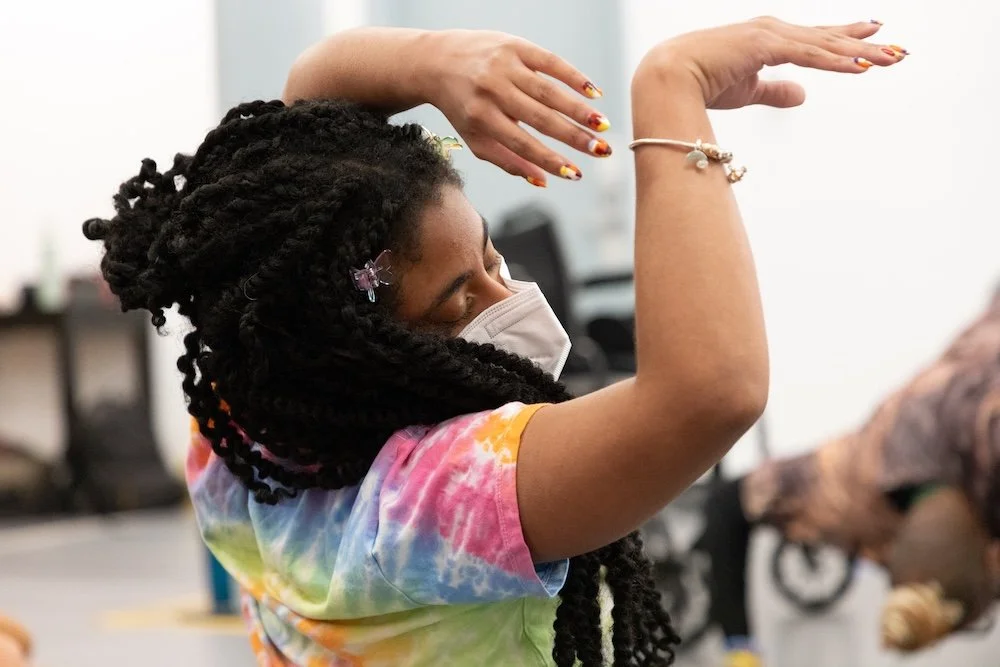HOW WE Move
A dance intensive created for and by D/deaf and Disabled dancers and centering multiply marginalized (BIPOC, LGBTQIA+) dancers within our communities.
Deadline extended until Oct 22 at 5pm PT!




How We Move is our opportunity as D/deaf and Disabled dancers to figure out what we want to create outside of a mainstream dance lens—while unpacking our own internalized ableism. What’s possible when we stop assimilating to a non-disabled dance world? What happens when we move from the margin to the center? Together, we’re about to find out.
India Harville, Executive Director of Embraced Body and Co-creator of How We Move




What is How We Move?
This six month hybrid program combines virtual gatherings with a 10-day in-person intensive in New York City, providing space and opportunity for multiply marginalized D/deaf and Disabled dancers to move together, collaborate, and build cross-disability community.
How We Move will provide a rigorous access framework. Together, we’ll cultivate opportunities on our collective terms and build power towards a transformation of the colonial, eugenicist, and ableist lineages still present in our field.
APPLICATION FAQs
-
How We Move is for multiply marginalized D/deaf and Disabled dance artists.
We define disability broadly:
Mobility Disabilities
Neurodivergence
Mental Health Disabilities
Developmental Disabilities
Intellectual Disabilities
Sensory Disabilities
Chronic Illness
Chronic Pain
Other Disabilities
We define multiply marginalized as being D/deaf or Disabled + being BIPOC, queer, trans, or other marginalized identity points.
You can be at any stage of your dance journey, as long as you:
Are interested in learning about cross-disability solidarity and dancemaking
Are willing to share a workshop about your practice to your peers
Have a commitment to building disability community
Want to build a longer-term relationship with a cohort
Have an awareness of your own access needs and want to learn more about access
Are interested in disability aesthetics
-
We will provide some combination of the following access, based on what is requested by program participants.
For in-person events
Live audio description/audio description
American Sign Language (ASL) for all group activities, including meals
CART
Wheelchair accessible
Accessible transportation
Accessible and gender neutral restrooms
Masking and Covid precautions
Soft lighting options
Low-sensory space
Fidget toys
Accessible seating options
Breaks
For virtual events
CART
ASL
Transcripts
Recording
Audio description
Camera optional
Breaks
-
Each participant will receive a $2,000 stipend.
An additional $1,000 stipend is available for Personal Care Attendants (PCA) who attend the in-person intensive with a participant.
How We Move will also cover housing, travel, ground transportation, and meals for all participants and Personal Care Attendants (PCAs) of the in-person intensive.
How We Move will cover access costs for all virtual gatherings and the in-person intensive.
-
We are committed to prioritizing the centering of BIPOC, Queer, and trans D/deaf and Disabled dancers in the intensive; including the centering of QTBIPOC D/deaf and Disabled artists in all leadership roles.
We are committed to creating spaces for cross-disability experience and collaboration, aiming to undo any hierarchy that positions a singular disability category as the representation of our community’s multiplicity.
We are committed to dismantling the gatekeeping that deems some of us legible due to professional/educational opportunities many of us are denied access to. Our space is open to anyone who experiences dance/movement as a central practice in their lives, regardless of training level or previous institutional support.
We are committed to providing professional development opportunities both within the intensive and in the field as a whole, including collaboration with non-disabled accomplices looking to expand their access practices and training Disabled artists to become facilitators, teachers, and mentors themselves.
We are committed to providing the space for artists to build relationships with one another and to prioritizing addressing the most pressing issues raised by participants in the intensive.
We are committed to providing a blueprint and guidance for other artists seeking to create similar intensives within their own cities and communities.
-
2025: Applications
September 2: Applications open
September 25, 4-6PM PT: Virtual Applicant Q&A session
October 22, 5pm PT: Applications close
2026: Virtual sessions and in person intensive
March 21, 10:30am-1:30pm PST: Virtual Pre-Meeting #1
April 30, 2pm-4pm PST: Virtual Pre-Meeting #2
May 1: 2pm-4pm PST: Virtual Pre-Meeting #3
May 2, 10am-12pm PST: Virtual Pre-Meeting #4
June 21: Arrive & settle in New York City
June 22-July 1: How We Move Dance Intensive in New York City (We recognize that Disabled energy levels vary. We will build an intensive schedule together that works for all attendees.)
July 2: Travel back home
July 16, 2pm-5pm PST: Virtual Post Meeting
Apply to how we move
Deadline extended until Oct 22 at 5pm PT!
Choose the format of application that works best for your needs. If you choose the PDF or Word document, email your completed application to info@embracedbody.com.
If you need support completing your application or if you need the application in a different format, please email info@embracedbody.com.
Have questions? watch Our Q&A Session




MEET THE TEAM
-
she/her
As a Disability Justice activist, performance artist, public speaker, and somatics practitioner, India Harville has made it her mission over the past 20 years to open people's minds to the wonder of their own bodies as a vehicle for growth and transformation, both personal and collective.India has danced with Sins Invalid, Dance Exchange, California State East Bay, The Queer Arts Festival, the Black Spirit Dance Collective, Mouthwater Festival, and Movement Liberation. She’s a two-time recipient of the Access Movement Play Residency funded by Mellon and is currently working on a one-woman show, Liminal. She’s certified as a dance instructor in: NIA, Zumba, Dancing Freedom, and DanceAbility, where she is both a Master Teacher and Master Trainer.
In 2016, she founded what is now known as Embraced Body, a Disability Justice and inclusive arts organization that began by providing accessible movement classes to Disabled communities. Since then, they’ve made disability-affirming dance funded by major philanthropic organizations, while also consulting on accessibility and Disability Justice.
The intersection of India’s own identities as an African American, queer, Disabled/chronically ill, femme, cis woman informs all her work. No matter what she is doing, she sets forth the example that however our bodies show up in the world, they are perfect, worthy of existence, and capable of magic.
-
she/her
Kayla Hamilton is a Texas-born, Bronx-based dancer, performance maker, educator, consultant, and artistic director of Circle O—a cultural organization uplifting Black Disabled and other multiply marginalized creatives.She has developed & designed access-centered programming for the Mellon Foundation, Movement Research, DanceNYC, and UCLA, and is a co-director of Angela’s Pulse/Dancing While Black.
Kayla is a Jerome Hill Artist Fellow, Pina Bausch Foundation Fellow, United States Artist Disability Futures Fellow, NEFA National Dance Project Production Grant recipient, and Bronx Cultural Visions Fund recipient. Her work has been presented at the Whitney Museum, Gibney, Performance Space NY, New York Live Arts and Bronx Academy of Arts and Dance. Kayla was also part of the Bessie award winning ensemble Skeleton Architecture.
As an educator, Kayla co-developed ‘Crip Movement Lab’ with fellow disabled artist Elisabeth Motley—a pedagogical framework centering cross-disability movement practices. She also worked as a K-12 public school special education teacher in NYC for 12 years.
-
they/themJJ Omelagah (they/them) is the Program Director, Access Doula, and Healing Artist for Embraced Body and the founder of Sounds of Kayode.
With two decades of experience in human services and healthcare, JJ brings a unique perspective on care. They provide crucial access support and education while contributing to the organization's overall operations.
As a transgender sound artist, JJ’s mission is to create vibrant frequencies resonating with collective care, healing, and transformation. Each note contributes to the co-creation of a sonic environment where energies converge, intertwine, and uplift. They’ve performed at events such as SF Pride and the National Queer Arts Festival.
JJ studied at Howard University and City College of San Francisco and holds a certification in Project Management from the University of Arizona. They are also a trained Circle Sing Facilitator, Reiki practitioner, Orisha priest, and a committed advocate for Disability Justice and LGBTQIA+ rights. With comprehensive experience in Access Doulaship, project management, customer service, case management, conflict resolution, and volunteer management, JJ brings a wealth of knowledge to their work in access, care, and community building.
-
she/any
Jesenia (Jess–N–ee–Ya) is a queer first-generation Indigenous-Venezuelan-American, AutiHD (Autistic & ADHD), living with Ehlers Danlos Syndrome.She is an artist, community builder and organizer, disability advocate, scientist, cultural producer and activist. Her approach is rooted in anti-racism, decolonizing, disability justice, and accessible design.
Jesenia founded One Free Community, an online community center helping decolonizing people connect and build mutual aid initiatives together.
Jesenia founded NeuroSpicy Networking to help neurodiverse professionals network and find jobs and runs a consulting business of the same name.
She serves as a Communications Producer with Calling Up Justice and regularly teaches workshops on conflict resolution, access inclusion, creating neuro-affirming spaces and more.
Jesenia is a 2024 Emerge Fellow with the Longmore Institute. She also engages in disability advocacy with Women Enabled International.
-
they/them/themme
Ziiomi Law (Zee-o-me) is an embodied et cetera, period!A professional dancer & performer, arts administrative careworker, writer, community consultant, death doula, producer, model, and actor, previously nomadically based nowhere creating everywhere, currently re-rooting back home out of Atlanta, GA.
They are a Blackqueer non-binary icon who sweats possibility & oozes pleasure.
Zii was a proud member of the 6 time Lucille Lortel nominated, New York Times Critic Pick, cast of the Off-Broadway production (pray) in 2023.
Their movement lineages include, Urban Bush Women as a New York Van Lier Fellow, MBDance and SLMDances as a company member, and Atlanta Ballet and Alvin Ailey American Dance Theater as a scholarship recipient, to name a few.
They are most fulfilled when collaborating on projects that feel like soul food. Ziiomi believes if it ain’t a full body YES, it’s a no! You can find themme luxuriating at the intersections of both/and.
-
Movement Research, founded in 1978, is one of the world’s leading laboratories for the investigation of dance and movement-based forms. As a creative incubator for artists and emerging ideas, Movement Research provides space and resources for adventurous dance. Valuing the individual artist, their creative process and their vital role within society, Movement Research is dedicated to the creation and implementation of free and low-cost programs that nurture and instigate discourse and experimentation. Movement Research strives to reflect the cultural, political and economic diversity of its moving community, including artists and audiences alike.
In January 2019, Movement Research moved into its first permanent home at 122 Cultural Center. In 2024, Movement Research broke ground on the build-out of its two studio spaces located in 122CC to create: two dance studios to house MR programs and to serve artists and the community with subsidized rates for rehearsals, practice and convenings; a vestibule outside of the studios that offers a space to gather, stretch and converse; a resource room to provide meeting and lounge space for artists, and access to MR’s library and publications.
PrESS
Press Release: Aug 5, 2025
-

The Dance Enthusiast
DANCE NEWS: Announcing Next 'How We Move' Program for D/deaf & Disabled Dance Artists
-

Stance on Dance
Moving at The Speed of Access: An Interview with How We Move Program Director India Harville and Program Manager JJ Omelagah
-

thINKing DANCE
When Something Does Not Exist, We Must Create It
-

Dance Magazine
How We Move Offers a New Kind of Intensive Designed for Disabled and Multiply Marginalized Artists
-

Broadway World
Embraced Body Announces How We Move Program
-

Dance Informa
Embraced Body Announces How We Move Program
FUNDED BY MELLON FOUNDATION












